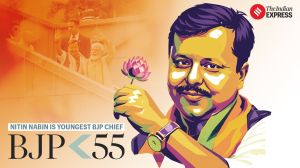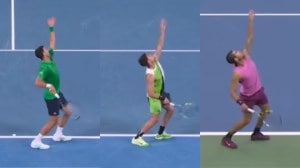IN RAHUL8217;S BACKYARD
There is a frisson of excitement, a sense of expectancy in Rae Bareli and Amethi with Rahul Gandhi finally given official charge of the Congress party's frontal organisations. Will the rural expanses there become the launching pad for the Grand Old Party's rebirth in Uttar Pradesh?

Just opposite 8216;Pehelwan Transport8217; in Amethi is a largish complex that constitutes the Congress party office of the area. It houses the Rajiv Gandhi Charitable Trust, a Sachal Swasthya Kendra and two halls, which are locked if you reach there before noon.
It has been a heady week for activists of the Youth Congress and NSUI in this oasis of Congress support as Rahul Gandhi has been appointed as the party general secretary in charge of them. Senior activists say they are thrilled to see the once chulbula Rahul evolving into such a gambhir serious leader.
So why is the coir mattress-lined room with several red plastic chairs, a centre table and a black-and-white photograph of Sonia and Rajiv together in happier times, locked usually? Aren8217;t there separate offices for the NSUI and the Youth Congress?
Dharmendra Tripathi, 32, in a white Levi8217;s T-shirt and a silver Blackberry in his hand, bristles at the query. 8216;8216;Politics is not our business or a routine, it8217;s a family affair. Aisa toh nahi hai ki koi kurta pyjama aa kar taanga jaaye, ya koi haazri di jaaye. Koi vetan nahi hai. This is not about attendance or hanging our kurta pyajamas. We are not salaried politicians,8217;8217; says the Uttar Pradesh Youth Congress general secretary. 8216;8216;Priyankaji had decided that we will meet formally on the first Sunday of each month, discuss our problems and then take them to Gauriganj, where on the last Sunday of the month, the Congress meets. We talk about our problems and issues there.8217;8217;
Politics here is not fulltime. Tripathi has a Reliance dealership and he also supplies 8216;labour8217; for HAL there. The Youth Congress claims a membership of 5,000 and, they say, around half of the members are educated and employed, the rest, looking to 8216;8216;improve their prospects8217;8217;.
Some people remember a similar juncture in history. 8216;8216;Rajiv Gandhi used the young to create his team. There was great enthusiasm to join him and get connected to him in 1985,8217;8217; says Ashok Dube, who started his career in the Youth Congress and is now the Block Congress Committee president. Dube, in his early fifties, recalls how Rahul now is in the same mould but is practical. 8216;8216;He is very conscious about education, and empowerment through it, he is always talking about it. See, the slogan on his poster also says, 8216;change is in your hands8217;. There is infotech here now, a hotel management institute is coming up, a DPS branch is also being opened. He realises that people here want to better their lives, and then rozgaar, or jobs,8217;8217; he says.
Rahul also has history egging him on. Prem Narayan Tripathi, an advocate-cum-Youth Congress activist, says, 8216;8216;The youth were inspired in Sanjay Gandhi8217;s times. Look at how he helped revive the Congress after 1977, it was all through just the Youth Congress bursting on the scene. No other political party today is giving youth any importance. But with somebody of Rahul Gandhi8217;s stature now focusing on the youth, without using them for riots or fasaads like some parties do, it can only reap political dividends for us.8217;8217;
The National Students Union of India NSUI, which also functions out of the same two rooms housing the Youth Congress, says it has 8216;8216;2,5008217;8217; members, as 8216;8216;there is no ABVP and SFI here for the past two years8217;8217;. No wonder Amethi NSUI president Prashant Tripathi boasts, 8216;8216;Yahan hamara ek chhatra raj hai8212;a one party rule.8217;8217; They collect as they do, nationally a Rs 2 fee annually from members. For every 25 members, there is one main active member here.
Despite the BSP Government banning politics on campuses, the NSUI here is not deflated. We have plenty to do, they say. 8216;8216;We help students with problems like filling out admission forms, help those who cannot fund their education, even assist the nearby Gausiya Madrasa to find money to teach the children who go there,8217;8217; says Prashant.
An MA in Sociology, Prashant does regret, however, that women in his organisation number only 30-35. Prashant is accompanied by two diffident members, whom the seniors says 8216;8216;are necessary for poster-making and banners8217;8217;. The two, Ashutosh Mitra and Kuldeep Tripathi, are both enrolled in their B Pharma, and hope to make something of their lives later. What attracts them to NSUI is the fact that this is Amethi and this is about being in Rahul Gandhi8217;s direct team.
Ask Prashant about the arrogant and brash image of NSUI members undergoing a change with the Congress out of power in the state, and he smiles, 8216;8216;NSUI hi nahi, Congress mein bhi toh maturity aayi hai. Now, those who are educated have a say. We have always had Rahul8217;s support and now that he has an all-India charge, the organisation can be rebuilt throughout UP and India.8217;8217;
Rahul undeniably has a devoted young force here, and with his 8216;core committees8217; about 300 volunteers in villages throughout his constituency who teach less-privileged students8212;6,000 students in all it has greatly added to his brand equity. The Rajiv Gandhi Charitable Trust runs a tailoring programme for girls. Urmila and Gayatri, two of the beneficiaries, cycle over 8 km six days a week to learn cross-stitch and how to cut a suit. This will earn them up to Rs 200 per salwar-kameez set.
Personal loyalty, devotion and a belief in the goodness of the Gandhi family have nourished the organisation in both Amethi and Rae Bareli for over two decades now. As youngsters here tell you, 8216;8216;MLAs also don8217;t go as often to their constituencies as Rahul bhaiyya does-at leat once a month. He listens to all of us, wants to know everything and tries to solve our problems.8217;8217;
But the personal touch has only compensated so far for the lack of an organisational set-up, which despite their utter devotion and faith in the 8216;family8217; the youngsters still say in hushed tones, may not be enough to take the Congress first past the finishing line in the years to come.
In the interiors of his own constituency lies the opportunity and a poser for the 37-year old MP. Deep in Poonpur gram sabha in Amethi, destitute Dalit agricultural worker Rambhajan has some good things to say. He was evicted by the powerful Thakur lobby and his hut destroyed, incidentally at the time when Mayawati was the CM in 2003. Priyanka Gandhi had taken up his cause, received a lot of media attention and personally supervised the filing of the FIR. Fresh land was bought 100 m away from his house and the Congress used the Youth Congress cadres to build a 900 sq ft pucca house for him in five days. Says the 60-year old: 8216;8216;These Youth Congress people helped me and stood by me then. I had nobody by my side because my seven sons and I refused to work for the landlords.8217;8217;
Rambhajan is an interesting metaphor for the Congress Youth experiment of using the cadres as an effective political force. But while they succeeded in building his house and winning his trust, there is now no trace of the FIR that Priyanka personally ensured was filed, and no follow-up action from even a 8216;bahujan samaj8217; government. Rambhajan is lost today and weeps profusely when he shows you his land, just a few yards away, pointing out the neem, jamun, bamboo and babool trees surrounding it. 8216;8216;Mere purkhon ki zameen hai. Yeh oonchi jaat wale jal rahe the mujhse kyonki mere ladke khet mazdoori chhod band baja rahe the aur namak ka dhandha kar rahe the. Mein kya karoon? The land belongs to my forefathers, these higher caste people are jealous as my sons are involved in petty business and have moved on in life. Now what should I do?8217;8217;
Mein kya karoon? Beyond his little fiefdom and the support of the 6,000 IYC and NSUI devotees, Rahul Gandhi will have to find the answers to Rambhajan8217;s question. His ability to find an answer, and that too quickly, at an all-India level, would be what the Congress8217; rivals, the more recent claimants to the Congress voter base are closely watching out for.
WHAT RAHUL
IS EXPECTED TO DO to do
IYC:
Consolidate the ongoing membership drive and ensure streamlined promotion of leaders through the ranks. Ensure fixed tenure for all post. This will motivate the new generation and give fresh and young leadership to the Congress. Increase the autonomy of the IYC from the AICC.
NSUI:
Make it a truly national organisation. Ensure its activities are not restricted to student union elections. Ensure fixed terms and streamlined promotions.
THE
ORGNAISATIONS
IYC headquarters has no figures on members. Last count taken in 2001, but records destroyed by termites. IYC launched a new membership drive two months ago, targeting a strength of 2.5 crore.
IYC and NSUI completely depend on AICC for funds. 8220;Peons at AICC get Rs 10,000 and we get Rs 3000,8221; complains an IYC-NSUI staffer. IYC8217;s only asset is a Tata 407 retrofitted into a crude rath used for election campaigns.
Those who have have risen through IYC and NSUI include A K Antony, Kamal Nath, Priya Ranjan Dasmunsi, Ambika Soni, Digvijay Singh and Vilasrao Deshmukh. 8220;Earlier, one would be a NSUI president, IYC general secretary, then IYC president. P V Narasimha Rao changed it all,8221; says a former IYC president.
Rajiv Gandhi considered the two organisations as the future of the party. 8220;Between 1983 and 1984, nearly 70 NSUI leaders were made MLAs across the country by Rajiv,8221; recalls Ramesh Chennithala, Kerala PCC president.
PRIORITIES
FOR RAHUL
8220;It is an opportunity to transfer, revitalise IYC into a pan-India organisation to attract young men and women who have a commitment to the society and also have the ability to make meaningful contribution in India8217;s emergence as a major power.8221;
Anand Sharma, Minister of State for External Affairs
8220;Each period has its own challenge. At this time I think the IYC should focus on empowerment and unemployment.8221;
Ambika Soni, Minister for Culture
A DAY IN THE LIFE OFRAJESH MISHRA, YOUTH CONGRESS WORKER
I am 31 and an advocate in the tehsil here, apart from being with the Youth Congress in Amethi. I have two cellphones, one for political work and the other is for my clients.
My day starts early, in my village Badgaon, with 10-12 people approaching me with their problems. If five of them are court-related problems, the others are political, with problems like the thanedaar upsetting them, accounts people not listening to people, etc.
By 10 am I reach the tehsil on my motorcycle, start court-related work, meet some political workers. I have a chamber, chairs, good enough for meetings. In election times, there is a lot of politics-related court work, like chunaav zamaanati, getting bail for petty electoral offences under Section 116 or 191. I keep excellent ties with the thanedar, SSP and other officials.
In the afternoon, after 2 pm, we sit around with political friends in the party office or in the bazar and talk about politics and what is going on in Amethi and around the country8230;By evening, it8217;s back to home-related affairs.
We are not vetan-bhogis8212;we don8217;t receive wages from the party. We are about everything, party, parivaar, rozgaar. We are not just tied down to an afsar officer way of doing things. We think it is better this way, it helps the party more, if everything in our lives continues parallely.
I am dubla patla thin and look weak, but that is because I talk a lot, do a lot of hard work.
- 01
- 02
- 03
- 04
- 05































